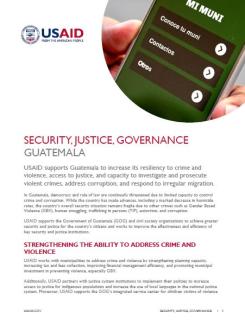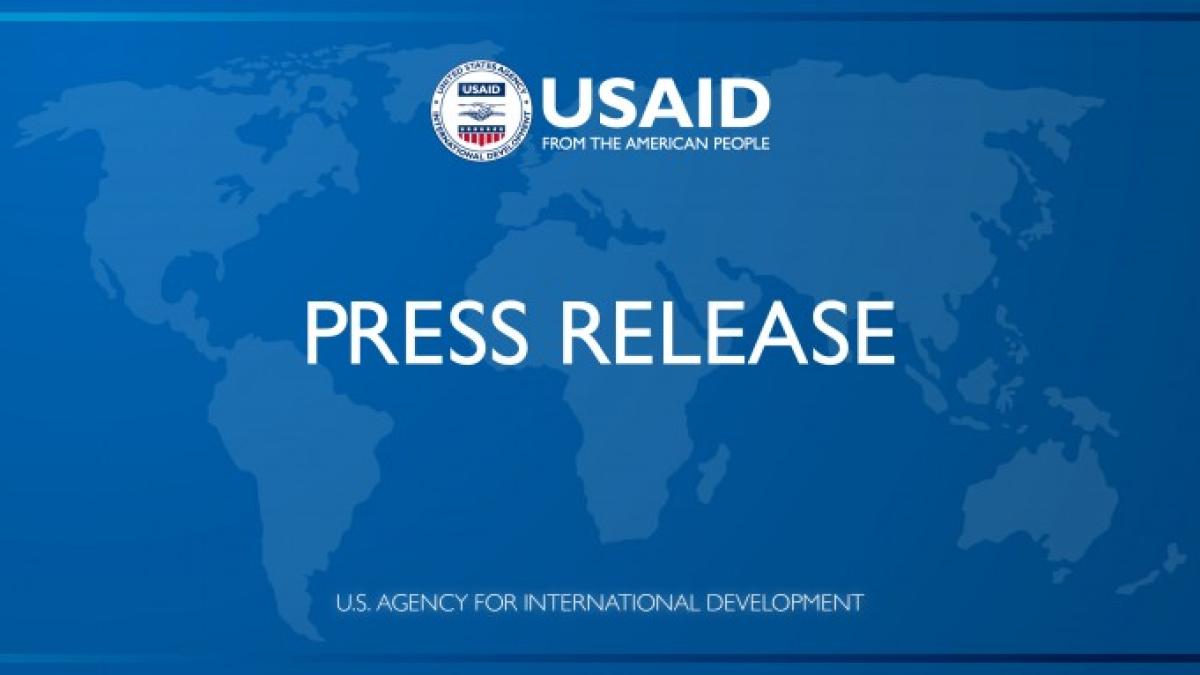
USAID supports Guatemala to increase its resiliency to crime and violence, access to justice, and capacity to investigate and prosecute violent crimes, address corruption, and respond to irregular migration.
In Guatemala, democracy and rule of law are continually threatened due to limited capacity to control crime and corruption. While the country has made advances, including a marked decrease in homicide rates, the country’s overall security situation remains fragile due to other crimes such as Gender Based Violence (GBV), human smuggling, trafficking in persons (TIP), extortion, and corruption.
USAID supports the Government of Guatemala (GOG) and civil society organizations to achieve greater security and justice for the country’s citizens and works to improve the effectiveness and efficiency of key security and justice institutions.
Strengthening the Ability to Address Crime and Violence
USAID works with municipalities to address crime and violence by strengthening planning capacity, increasing tax and fees collection, improving financial management efficiency, and promoting municipal investment in preventing violence, especially GBV.
Additionally, USAID partners with justice system institutions to implement their policies to increase access to justice for indigenous populations and increase the use of local languages in the national justice system. Moreover, USAID supports the GOG’s integrated service center for children victims of violence to ensure children have access to services and the protection they need and strengthens the investigation and prosecution of violence against children.
Capacity and Commitment to Combat Corruption
USAID strengthens transparency and accountability within the justice sector and oversight institutions. USAID promotes open justice principles to improve access and use of publicly available information to increase transparency. In support of the presidential anti-corruption platform, USAID partners with the justice sector to better investigate, prosecute, and adjudicate corruption cases, and dismantle criminal networks. Recently, USAID has also helped develop new investigation and case management models to investigate potential fraud and embezzlement cases linked to COVID-19 response.
Improved Institutions to Address Irregular Migration
USAID partners with the Government of Guatemala to reduce irregular migration to the United States, with a focus on violence prevention activities for children, strengthening access to the justice system for all citizens, and addressing the root causes of crime and violence. USAID provides integrated services to returned migrants including temporary housing, transportation, and hygienic supplies in order to make their reintegration successful and avoid repeated attempts at illegally migrating to the United States. In addition, USAID strengthens national capacities to ensure the dignified return of unaccompanied children, including family reunification services.
During the COVID-19 crisis, USAID has provided key humanitarian support for shelters designed to assist returning Guatemalans, specialized support to the Social Welfare Secretariat to ensure the protection of unaccompanied children, and the identification of potential victims of trafficking.
Improving Governance
Working closely with government institutions, USAID implements a wide-range of projects to address governance and democracy issues to reduce irregular migration, improve governance of public institutions, and increase civic participation. USAID’s projects focus on: Providing technical support to municipal and national institutions, engaging civil society and youth to promote rule of law and political participation, supporting free and fair elections, mitigating social conflict and advancing transparent and accountable governance and financial management.
At the local level, USAID strengthens the capacity of municipalities to deliver responsive, inclusive, and effective socioeconomic development by encouraging active civic engagement in the decision-making processes at the local government level. This strengthens communities in the areas of natural resource management, food security, health, and public financial management.
Civil Society and Youth
USAID partners with both the government and civil society to implement democratic reforms and advance positive political change through inclusion, creating the opportunity for civil society to influence decision-making and political processes. USAID also partners with youth to create a network of youth leaders that have the ability to more effectively engage in the political process.
Empowering Communities and Addressing Social Conflict
USAID empowers communities to create development plans to define and implement self-identified priorities. By identifying their needs, and a means to address them, communities strengthen social cohesion in an inclusive environment, and build alliances with the public and private sectors for community development, creating entrepreneurial projects in agriculture, business, and value chains in the Western Highlands. USAID also works with these communities to address the root causes of social conflict through the development of community visions that engage the Government of Guatemala and the private sector in devising strategies to promote social cohesion.

Programs
- Justice and Transparency
- Peacebuilding Project
- Electoral Governance and Reforms
- Addressing the Root Causes of Irregular Migration
- National Institutions Strengthening
- Protection of Victims of Trafficking in Persons (TIP) and Unaccompanied Migrant Children (UAC) Activity
- Governance in the Maya Biosphere
- B'atz Local Institutional Strengthening


